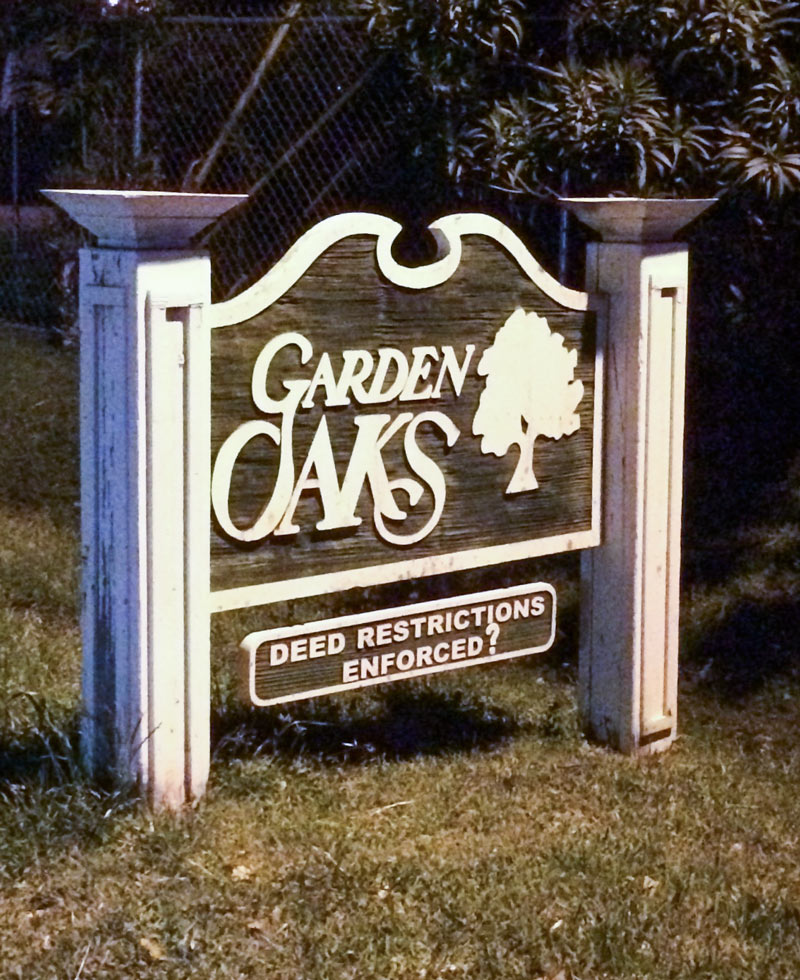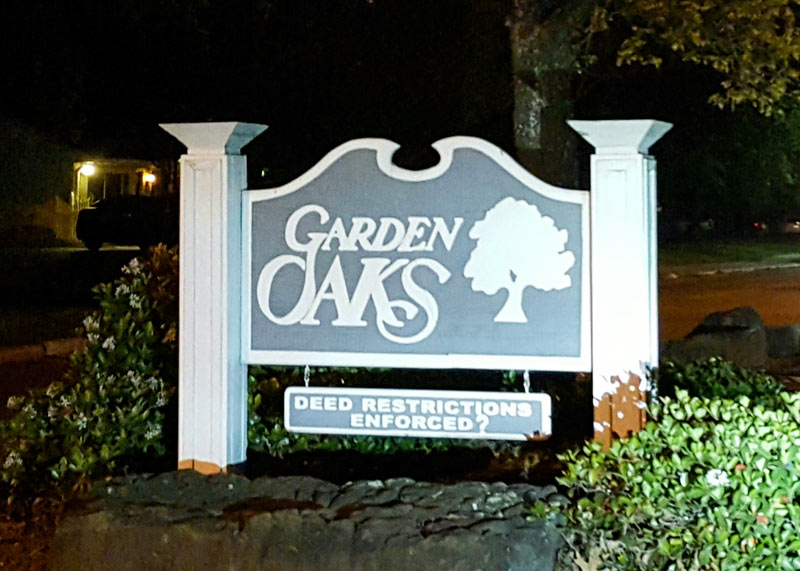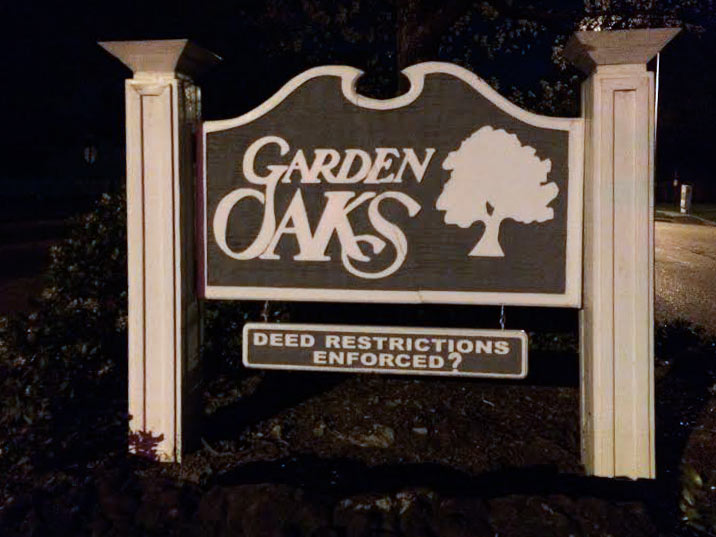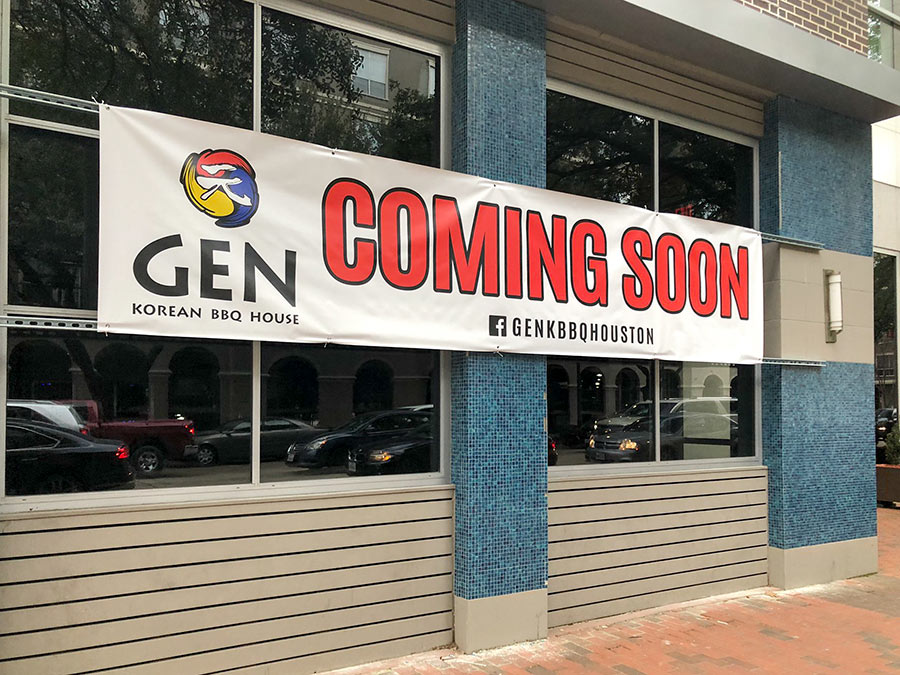
What’s the story behind the tiny question marks that recently appeared at the end of the low-dangling “DEED RESTRICTIONS ENFORCED” signs on at least a couple Garden Oaks welcome-to-the-neighborhood markers? More than just your usual neighborhood grumbling and graffiti-ing, it appears.
***

As The Leader reported in January, a lawsuit filed by the Garden Oaks Maintenance Organization against a couple of residents resulted in a ruling devastating to the neighborhood’s deed restrictions. Although the jury found that the defendants had violated the deed restrictions, it declared them not liable; instead, the deed restrictions were found to have been “abandoned” because they were enforced only selectively.
The GOMO was ordered to pay $80,000 to the defendants to cover their legal fees.

- Jury rules Garden Oaks Maintenance Organization selectively enforced deed restrictions [The Leader]
Photos: Swamplot inbox





Corrupt board makes exceptions for themselves. I wish this kind of scandal would happen to Heights historic districts, take those dictatorships down.
Added to the $80,000 GOMO was ordered to pay to the defendants, add the $110,000 (to date) GOMO has spent on legal fees for the case in question. Close to $200,000 spent pursuing a lawsuit they knew would not be one, given precedent set through prior selective enforcement.
This kind of thing is more common than you might think in Houston. It was true in my old old neighborhood, where I bought my first house. The details were different, but no less confusing. The original restrictions had expired. Someone had tried to rewrite the deed restrictions to get them back in force, but some other people had done a petition to rescind the changes. And there were also previous changes that were filed with the county and appeared to be in force, but they were not widely circulated and a lot of neighbors denied they existed. When I was President of the Civic Club I circulated the latest restrictions that were on file with the County, and people accepted it. The City never questioned any reports for violations of those restrictions. (Which we didn’t do very often). But I was always wondering if someone would come by and get them thrown out.
.
This is why if you’re going up Bissonnet just past Fondren and the bank, you’ll see “Established, 1956” and not “Deed Restricted” on the Larkwood subdivision sign. A nod to all the mods in there, and my effort (agreed to by the neighbors when I lived there) at sidestepping the whole deed restrictions question.
I feel energized by this ruling.
HOAs both should have teeth and should by monitored; They should be taken seriously.
For those who live under an HOA it’s important to know that it ‘works,’
If one chooses to live in an HOA community it pays to have an active membership and board. Like any organization with enforcement powers, the HOA needs constant inspection and involvement by those affected.
Selective enforcement in older neighborhoods (without impartial management companies) are likely more the rule than the exception, especially as these neighborhoods go through the usual “new, neglect, then renaissance” cycle.
Half the commenters on this article clearly don’t know that the existence of deed restrictions doesn’t mean that there’s a HOA.
While you’re at it….might as well go ahead and point out what still exists in the Garden oaks Deed restrictions…”racial restrictions”….check it out here: http://gardenoaks.org/gomo/
This is such a great victory for the ‘little guy’.
I hope to learn more about the home owners who fought back against the HOA and uncovered all the evidence of hypocrisy on the board (they had much more egregious violations than the one they were trying to stop).
Did they hire a PI? Was one of the residents retired and had a lot of free time to track down all this information?
Obviously some of the letter of the law is now unenforceable (vice & racial restrictions) but residents do have some stake in keeping a skyscraper from going up in the middle of the neighborhood.
I live in Oak Forest so the situation is slightly different, but let us just say that the HOA fees are voluntary.
Great story! Kudos to the jury for calling the hypocrisy what it is. This happens all across Houston as management companies continuously send out threatening letters or “courtesy” notices to adhere to rules that are selectively enforced. As a real estate broker, I have had several entertaining conversations with the “compliance” departments of these management companies.
Homeowners should pay particular attention to HOA board members who sometimes seem to think the rules don’t apply to them. What a surprise! I can only imagine the fun a jury would have seeing the examples of selective, arbitrary enforcement.
@UG
I went to look st the restrictions. There was something about “only people of Caucasion race” are able to live there. In the accompanying trascript, it was crossed out and this was writtne below it.
“Racial Restriction has been held to be invalid and unenforceable by the United States Supreme Court.”
I think they took care of it.
Good point Googlemaster. In my old neighborhood, there wasn’t an HOA. The Civic Club was a voluntary-dues organization that really just published a newsletter and did neighborhood volunteer work. Not much more than that.
.
I’m a little perplexed by people in Houston who claim that their HOAs are above the law. One thing that’s really awesome about the COH is that anyone can report deed restriction violations. All you need is knowledge of what the deed restrictions are and how to report. The City doesn’t rely on HOAs to enforce deed restrictions. So really, nothing is stopping anyone from reporting a violation at an HOA board member’s house. (I always made this clear when I was in the Civic Club in my old neighborhood).
.
If you’re in the suburbs it’s a different story, granted. But correct me if I’m wrong: Garden Oaks is in the City of Houston.
The racial restriction is crossed out in one place. But if you look through sections 1 through 5, it’s in there. unaltered. Regardless of whether it’s been crossed out or not, I find it interesting that the language remains in there at all. It still carries a quiet message.
UG: Your “quiet message” is all over the lovely state you live in. In case you or your g-g-g-grandparents missed it, there used to be slavery in this part of the United States! Yep, some people owned other people. There was a messy conflict more than 150 years ago that ostensibly settled that little issue, but some of the old guard, who for the most part were still driving the train, if you will, didn’t really like the outcome, so they tried to keep things as much like the “good old days” as they could. Racial and religious deed restrictions were common mechanisms to keep folks separated and downtrodden.
Of course the courts finally took care of that, too, more than 50 years ago. So no more “quiet message”. Right thinking people immediately think “Well, we should get that obnoxious statement out of our [pick your legal document]!” They are correct. But the real problem is in what it takes to fix things.
Ever tried to amend a set of deed restrictions? Didn’t think so. Most haven’t. It takes a whole lot of signatures and notarizations, and the inertia built into homeowners has to be seen to be believed. That issue is what makes it difficult to update deed restrictions to make them apply to today’s issues, instead of those that existed in the 1930s and 40s. And that’s why the “quiet message” still sits there, as a monument to past folly and intolerance.
@Al: While your comment about Texas being a former slave state is obviously correct, with all the negative implications that implies, it’s my understanding that private deed restrictions forbidding sales of properties to certain minority classes were used in residential developments elsewhere in the country as well. And of course it was federal policy that mortgages were to be insured only for home purchases in non-minority areas at least until the 1960s.
Good point Local Planner. It seems to me that Houston actually has a leg up on other cities with respect to integrated housing: for the simple reason that because we never had zoning, we also never had exclusionary zoning.
.
Of course as has been discussed on numerous occasions, Houston has allowed a network of deed restrictions to take the place of zoning (sort of) and the restrictions against selling to minorities can be considered a form of exclusionary zoning. But still, it was never cast in stone at the Municipal level and that’s a good thing.
.
Not that it really matters, the bans on selling to minorities are rendered moot by Federal fair housing law anyway. But still, it does make you cringe when you see them.
Their deed restriction says only “servants” could occupy the garage apartment.
Who has “servants” now a day?
@ ZAW: Texas HOAs come in lots of different flavors and you can get stung badly if you don’t do due diligence. Especially if you’re in any way…peculiar, let’s say. Its not so much that they’re above the law… The law itself is problematic.
There was a great Texas Monthly article a couple of years back. Here’s a link:
http://www.texasmonthly.com/politics/conflicts-and-interests/
ZAW,
About the servants in the garage apartments I found that interesting as well.
The restrictions are silent on Homeaway or AirBNB style lodging, I figure that most residents would prefer a quiet roommate as opposed to a new tourist family every week.
They need to go after the others who violated the restrictions.
If the deed restrictions were found to be abandoned, does that mean lots can now be sub-divided?